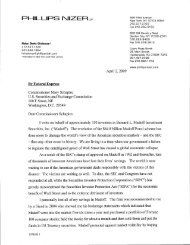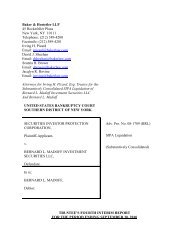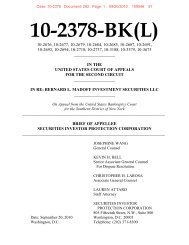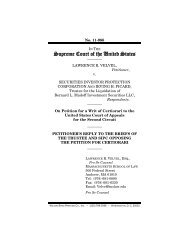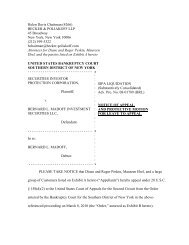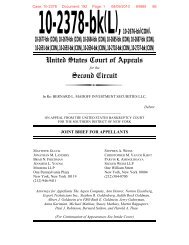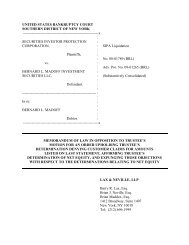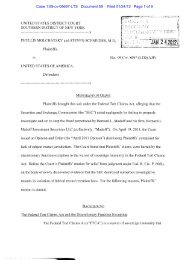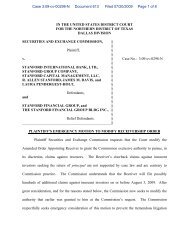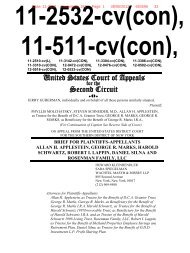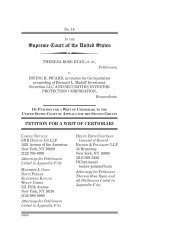Davis Polk & Wardwell LLP 450 Lexington Avenue New York, New ...
Davis Polk & Wardwell LLP 450 Lexington Avenue New York, New ...
Davis Polk & Wardwell LLP 450 Lexington Avenue New York, New ...
You also want an ePaper? Increase the reach of your titles
YUMPU automatically turns print PDFs into web optimized ePapers that Google loves.
e valued according to the amount of the initial investment. The court<br />
declined to base the recovery on the rosy account statements telling<br />
customers how well the imaginary securities were doing, because treating<br />
the fictitious paper profits as within the ambit of the customers’<br />
‘legitimate expectations’ would lead to the absurdity of ‘duped’ investors<br />
reaping windfalls as a result of fraudulent promises made on fake<br />
securities. . . . The court looked to the initial investment as the measure for<br />
reimbursement because the initial investment amount was the best proxy<br />
for the customers’ legitimate expectations.” In re <strong>New</strong> Times Sec. Servs.,<br />
Inc., 463 F.3d 125, 129-30 (2d Cir. 2006) (“<strong>New</strong> Times II”) (citations<br />
omitted) (emphasis added).<br />
The Trustee argues that BLMIS customers should be treated like the Fake<br />
Securities Claimants because – even though the securities listed on their account<br />
statements were real – Madoff purportedly could not have obtained the aggregate<br />
securities positions set forth on all of his thousands of customers’ account statements. 4<br />
(Tr. Br. at 40-41.) 5<br />
The argument finds no support in the statute’s plain language or its<br />
purpose. As SIPA and <strong>New</strong> Times I make clear, if customers’ account statements reflect<br />
securities positions in real securities that can be “liquidated by sale or purchase on the<br />
filing date,” the Trustee must either purchase the securities or pay customers the market<br />
value of those securities on the filing date. 15 U.S.C. § 78lll(11). Moreover, SIPA’s<br />
4 As explained in the text, the argument is irrelevant to the determination of “net equity” under the<br />
statute. The argument fails for the additional reason that SIPA considers only “the account or accounts of a<br />
customer,” 15 U.S.C. § 78lll(11), not all of the broker’s customer accounts in the aggregate, which is<br />
consistent with the statute’s purpose of protecting each customer’s legitimate expectations.<br />
Moreover, the Trustee’s suggestion that BLMIS customers do not have “net equity” claims<br />
because their securities positions were allegedly impossible to achieve (Tr. Br. at 40-41), or because the<br />
Trustee now believes “red flags” of Madoff’s fraud were evident, just reprises a similar argument that SIPC<br />
made – and that was flatly rejected – in <strong>New</strong> Times I. Both the SEC and the Second Circuit made clear in<br />
<strong>New</strong> Times I – over SIPC’s objection – that SIPA has no “goal of greater investor vigilance.” See <strong>New</strong><br />
Times I, 371 F.3d at 87 (rejecting SIPC’s contention that customers should be compelled to perform<br />
sufficient diligence to confirm that their securities positions are not fake).<br />
5 “Tr. Br.” refers to the Memorandum of Law in Support of Trustee’s Motion for an Order<br />
Upholding Trustee’s Determination Denying “Customer” Claims for Amounts Listed on Last Customer<br />
Statement, Affirming Trustee’s Determination of Net Equity, and Expunging Those Objections with<br />
Respect to the Determinations Relating to Net Equity. “SIPC Br.” refers to the Memorandum of Law of<br />
the Securities Investor Protection Corporation in Support of Trustee’s Motion for an Order Denying<br />
“Customer” Claims for Amounts Listed on Last Statement, Affirming Trustee’s Determination of Net<br />
Equity, and Expunging Those Objections with Respect to the Determinations Relating to Net Equity.<br />
5



